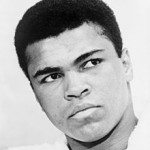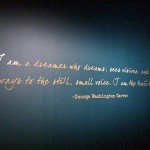 There’s so much at work in the story of this last week and the Orlando shootings. An angry young man, with a record of violent acts and words as far back as third grade. And these angry young men seem to be everywhere, firing away in a Colorado cinema, a San Bernadino office party, a Bible study class in Charleston, a Connecticut first grade classroom, and a popular nightclub in Orlando.
There’s so much at work in the story of this last week and the Orlando shootings. An angry young man, with a record of violent acts and words as far back as third grade. And these angry young men seem to be everywhere, firing away in a Colorado cinema, a San Bernadino office party, a Bible study class in Charleston, a Connecticut first grade classroom, and a popular nightclub in Orlando.
In Orlando, a mixed-up mess of a man, a wannabe terrorist and a sexually twisted man, led a double life as a gay-hating straight man and a socializing gay man who went to the Pulse club many times over four years and spent time online in gay chatrooms.
A religious man, he went often to his mosque. He rooted his hatred in his religion, and felt justified in his hate. Or so he said to some.
Friday on CNN I heard an openly gay Imam who lives here in the US explain that the Koran does not say you can’t be a Moslem if you are gay. That opinion, he said, is expressed in the Sharia, which is a book of interpretations that translates the Koran into law.
Another gay Imam, on another CNN program, said he was getting emails from his devout, hijab-wearing, Arab relations, expressing support and care for his homosexual self as well as his Islamic self. And an American friend, married to a Turk and traveling with him there now, wrote about her disappointment that Istanbul’s ten-year-old gay pride march has been cancelled because of all the unrest in the world.
In all of this I hear that Islam is changing, evolving, as Christianity and Judaism also are, and that Islam is in the process of growing new understanding of changing sexual mores, in the new world and the old.
Change is painful. It has been painful here. Not many years ago a young gay man, Matthew Shepard, was beaten, tortured and left to die hanging on a fence in Laramie, Wyoming,because he was gay. And he did die six days later in a hospital in Ft. Collins, Colorado, making this a murder, one that stunned the nation.
We’ve evolved from a culture where men could be thrown out of the armed forces for being gay, to a culture where gay marriage is permitted, even in military chapels. Yet the FBI reports that slightly more than 20% of hate crimes in the US in 2015 were attacks on homosexuals and transgendered people.
What the Christian tradition can do for the world, and for the love of God, in response to Orlando, is to talk more and teach more about the evolution of our understanding of human sexuality and the grace of God. And the evolution of our understanding of Islam.
We can teach welcome, acceptance and understanding of gay, lesbian, bisexual, and trans people, and of many other relationships besides nuclear family marriages and monasticism. And we can open relations with Moslem communities, which are arising everywhere in these United States.
Jesus, who embraced and championed prostitutes, and saved a woman who was being stoned for adultery, whose own sexuality is unclear to us, never spoke a word against homosexuality. He could have, but he chose not to. He also never spoke about marriage, never offered a single word of advice to couples, never extolled any virtue in that lifestyle nor did he recommend it to any. He did not forbid sex before marriage Neither did he extol celibacy, or monastic, single-gender communal life. And he did not describe the kingdom of God, or resurrected life, as life without sex. He did, in fact, often say that the kingdom is already among us, beginning now, not after death. And therefore sexual life exists within the kingdom.
Paul, an interpreter of Jesus, extends many opinions about virtuous living, turning Jesus life and teaching into rules for living. But these are not central, immutable teachings. Most churches, for instance, no longer ask women to cover their heads in church, though Paul does, and most Protestant churches now ordain women though at least one epistle orders women to be quiet in the church. But this is not Jesus speaking.
The Ten Commandments, the central and most important law of Judaism, also central to Christianity, only refer to sexuality in one specific ban on adultery. There is no ban on any other form of sexuality. There might have been. Moses was no fool, and he grew up in the cosmopolitan court of Egypt. But neither Moses nor God found bans on sex, other than adultery, to be essential.
In Judaism and in Christianity understandings of human sexual life and of marriage have evolved and changed as eras, economies, the availability of food, housing, and work have changed. In the midst of all this, and with increasing knowledge about how sexual identity is formed, the entire cultural pattern of friendship, courtship, and married life, has evolved and changed.
The Church has a lot of improvement to make in its teaching about good human life. It is a distortion of Jesus’ teaching to hold up one lifestyle, marriage, as the highest good and best virtue, when Jesus did not teach this. And it is a distortion of Jesus’ teaching to require celibacy in the priesthood or in young adults who are not married.
It is cruel to treat the divorced as if they were second class human beings. And it is heinous to push gay men or lesbian women into heterosexual marriages, cruel to them and to those they marry. And it is unreasonable to teach that other religions are not God’s.
Pulse managed to be a place where all sorts of people in all sorts of relationships came to find friendship and enjoy themselves. There was a time in American culture when churches were such places. It’s been a long time, though, since that has been true.
In a way, Pulse was functioning as a church last Saturday night. And the shooting there was as much an act of blasphemy as the shooting a year ago at Mother Emanuel Church in Charleston.
May the words of our pulpits and the meditations of our hearts, in these coming weeks, extend the warm embrace Jesus gave to those considered sinners in his time, in our time, in every time.
________________________________________________________________
Image: Rainbow Flag, from enwikipedia.org










